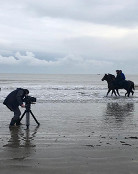Donn's Articles » Gambling Regulation Bill
Gambling Regulation Bill
The betting landscape is not what it once was. Times were that, if you had a bet, you had a bet on a horse or on a dog, and you went to the racecourse or the dog track or the bookmaker’s office in order to do so.
As well as that, if you didn’t go to the track, you probably couldn’t watch the race, unless it was one of those comparatively rare races that was shown on terrestrial television, which didn’t need the terrestrial descriptor back then. At best, you were reliant on the commentary from the Extel ‘blower’, which often bore no resemblance to the report that you read in the Sporting Chronicle the following day.
That landscape is but a distant memory now. These days, you go into any betting shop, at any time of the day, and you are presented with myriad opportunities to bet. You don’t have to wait for the first race at Thirsk or at Romford. With virtual racing and virtual dogs and bingo and balls and roulette wheels, if you are standing in a betting shop, there is hardly a minute that goes by, quite literally, in which a betting opportunity does not try to draw you in.
More than that, turn on your computer, and you are only a click or two away from the lure of slots and spins and flashing lights and bonus buys and jackpots.
It is in this environment that the modernisation of gambling regulation in Ireland is essential and, to that end, the new Gambling Regulation Bill is an important piece of legislation. Championed by Minister of State at the Department of Justice and Law Reform James Browne, the bill passed committee stage on Tuesday evening.
The new bill will regulate gambling in Ireland while recognising the betting landscape, such as it exists today. And that is essential. The legislation also provides for the establishment of a new dedicated body, the Gambling Regulatory Authority of Ireland, which can only be a good thing.
“This bill takes a responsible approach,” said Taoiseach Micheál Martin at the press conference that was held on the approval of the new bill last November. “It introduces serious new safeguards to protect people from falling prey to gambling addiction, while also balancing the freedom to enjoy responsible gambling.”
The spirit of the bill is to protect children and to protect the vulnerable, and that makes lots of sense. To that end, however, one aspect of it is the banning of all gambling advertising on television between 5.30am and 9.00pm, and such a ban could have far-reaching consequences for Irish racing.
The two dedicated horse racing channels both said during the week that the coverage of racing in Ireland would be difficult if the ban was introduced.
“There would be substantial economic and operational challenges in ceasing to carry gambling advertising, sponsorships, and branding on Racing TV,” said Martin Stevenson, CEO of Racecourse Media Group, the parent company of Racing TV. “It is likely to mean that it ceases to be viable to continue broadcasting in Ireland. We are very supportive that gambling legislation in Ireland is modernised to protect the vulnerable, but there is a significant risk that the unintentional result is that racing fans and the industry are no longer able to watch the racing channels in Ireland.”
Matthew Imi, CEO of Sky Sports Racing, expressed a similar view.
“We welcome the new Gambling Regulation Bill as we are strong supporters of responsible gambling,” he said. “We agree with the central premise on the need to protect problem gamblers and children. However, we are extremely concerned about the provision which proposes a ban on all gambling advertising from 5.30am until 9.00pm every day.”
Trying to view this dispassionately – which, admittedly, is not easy when you are in gainful employment with Racing TV – there is an argument for viewing the dedicated horse racing channels as a distinct entity. For starters, betting on racing is different to betting on spins and balls and slots. Unlike the spin of a wheel, every race is a puzzle, there to be picked apart and figured out. The research materials are there in the formbook for anyone who can take the time to study. It’s guesswork, but it’s educated guesswork. And there is a robustness to every race, an explanation for every result. There is a reason why almost €15 million is spent every year on integrity in Irish racing.
It is possible to make a profit in the long run when you are betting on racing. By contrast, it is not possible to make a long-term profit betting on the spins of a wheel. You will, of course, get back a certain percentage of your outlay, but, in the long term, that percentage will be less than 100.
As well as that, viewers of Racing TV and Sky Sports Racing, by definition, share common characteristics. And promotion on Racing TV is less about conventional advertising and more about bookmaker sponsorship during live programming. Also, you have to be 18 or over to have a subscription to Racing TV, and Sky Sports Racing report that 97% of their audience is over 24 years of age.
If racing were to disappear from Irish television screens, that could be catastrophic for the sport, for the industry, an industry that contributes an estimated €2.4 billion to the Irish economy and employs an estimated 30,000 people directly and indirectly. Not only would the industry lose out financially – and the media contributions have been crucial for racecourses in recent years – but Irish racing would lose the television exposure that it currently enjoys.
In that instance, in the long run, if the history of the loss of television coverage in other sports is any kind of guide, we could be looking at a completely different landscape.
© The Sunday Times, 16th July 2023


 Follow Donn
Follow Donn